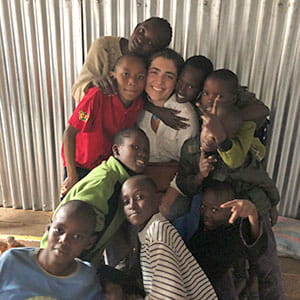Emma Roca ’21 is a perfect example, as she created a major called the “human perspective” with double minors in photography and music. “The human perspective is a mix of English, secondary education, sociology, and psychology,” says the Trumbull, Conn., native. “Essentially, I want to teach high school English in an inner city and then go into school counseling. In order to be not only an effective teacher and counselor, but also person, I feel I need to do my best to understand how we all work.”
Like all Endicott students, Roca will graduate with a resume and a degree thanks to the College’s renowned internship model. One of her unique internship experiences came when she taught in Kenya through Volunteer Abroad HQ (IVHQ). Upon her return to the U.S., we asked Roca what this life-changing experience was like, and you can read her answers in the Q&A below.
Describe your experience in Kenya.
I lived about 45 minutes outside Nairobi in a small, poor city called Kahawa West. The school I worked in was a community school, named Little Angels, with 300 children from ages 3 to 15. The first day I arrived, I was welcomed by all the children and wonderful director, led into a class, and handed a book and a piece of chalk. I taught 30 students in 45-minute blocks independently.
 Emma Roca '21 spent about a month teaching children
Emma Roca '21 spent about a month teaching children ages three to 15 a variety of subjects What was it like? What were the most rewarding experiences? What, if any, obstacles did you experience?
While there, I had the chance to visit an orphanage and become close with the 30 children and incredible orphanage director. The majority of the children attend the Little Angels School. I spent much of my time there while not teaching. We would play together, I helped them with their chores, and practiced speaking. They had so many questions about the U.S. The children are ages 1 ½ to 17. These kids have been through a lot to get to this orphanage, and hearing some of their stories was painful. However, it also had to make me marvel at the strength and hope that a 12-year-old can possess. Despite what they’ve been through, they are happy.
The orphanage was in bad shape when I got there. A lot of the kids had scabies, everything was mud, and disease spread easily. There were two ground toilets with no way to be flushed, no sinks, showers, and only a single tap that only had water when the city did, which was not consistent. When the city had no water, the children had no water. I had spoken to Boaz, the 30-year-old orphanage director who lives with the kids. He had mentioned a water tank in passing during a conversation and how it would help the state of the orphanage as they would have a constant supply. It would help keep the children clean and cut back on disease. So, I set off on making that possible. It was quite the process traveling around the city, supervising, and readjusting plans when something didn’t work. But by the time I left, the orphanage had a 5,000-liter water tank, a safe stand for it, gutters to catch any rainfall to fill the tank, plumbing throughout the orphanage, showers, a sink, a way to flush the toilets, taps, and a pump to pull the water from the city when there is water. I still keep in touch with Boaz every day and check on the kids.
How will you apply your experience in Kenya toward your career/future? What are your future ambitions?
Everyone has a different story. You don’t know what someone has been through 10 years ago or 10 minutes ago. I was teaching class (grade in the U.S.) seven composition. It was a double period—the first part was all about narrative writing, and for the second, I gave them a prompt and they had 45 minutes to write about it. The prompt was “tell me about an important day in your life.” I had a mix of responses, from days at the park seeing giraffes and zebras, to birthdays. However, one little girl wrote about the day she had to rush to the hospital and her dad died. After that, her mom became a drug addict, alcoholic, and abusive and she eventually got sent to live with her uncle because it was unsafe. I would have never known. This is something I always try and apply to my life. I want to work in an inner city with high schoolers. Whenever I tell people this, they don’t understand. They see danger and students who don’t care. I see students who just might be stuck and have stories.
Interested in learning more about an individualized major through Endicott? Learn more at endicott.edu.


